Roots of Resistance







Edited and Designed by Green Lions and Baesianz. Featuring Makan, Energy Embargo for Palestine, Yung & Marie-Therese Png.
ESEA Green Lions
with Makan
ESEA Green Lions is a climate justice collective for East and South East Asian (ESEA) people to connect and organise for climate justice through creativity, collective action and intergenerational connection. Our environmental practice is rooted in anti-racist and decolonial perspectives, acknowledging how this intersects with climate and social justice.
Baesianz is a London-based collective and creative platform that celebrates Asian artists from all over the globe. Born from a shared need to nurture our Asian roots and uplift Asian communities through the lens of art.
Makan is an independent, nonpartisan organisation dedicated to intersectional learning. We provide transformative education aimed at strengthening the movement for Palestinian liberation, contextualising Palestine within the broader framework of social justice and global liberation.
Energy Embargo for Palestine is a British-based anti-imperialist climate collective that aims to disrupt energy flow for the isolation of Zionism. They use direct action as a tool to confront complicity in Zionist and imperialist energy interests, raise political consciousness, and politicise energy in social justice movements.
Marie-Therese Png is a British, Afro-Caribbean and ChineseSingaporean transnational coalition builder, community organiser, and investigative researcher whose research lives at the intersections of technology supply chains environmental justice and antimilitarism.
Yung Au is a postdoctoral fellow at the University of Oxford where their work examines the supply chain of surveillance technologies through abolitionist and coloniality frameworks. They are also a member of No Tech for Tyrants and previously an associate lecturer at UAL.
Illustrations by Marijn Rikkerink, Dania Arafeh’s Sido and Tata, Rafaella George.
Nature photographs by Sami Kimberley.

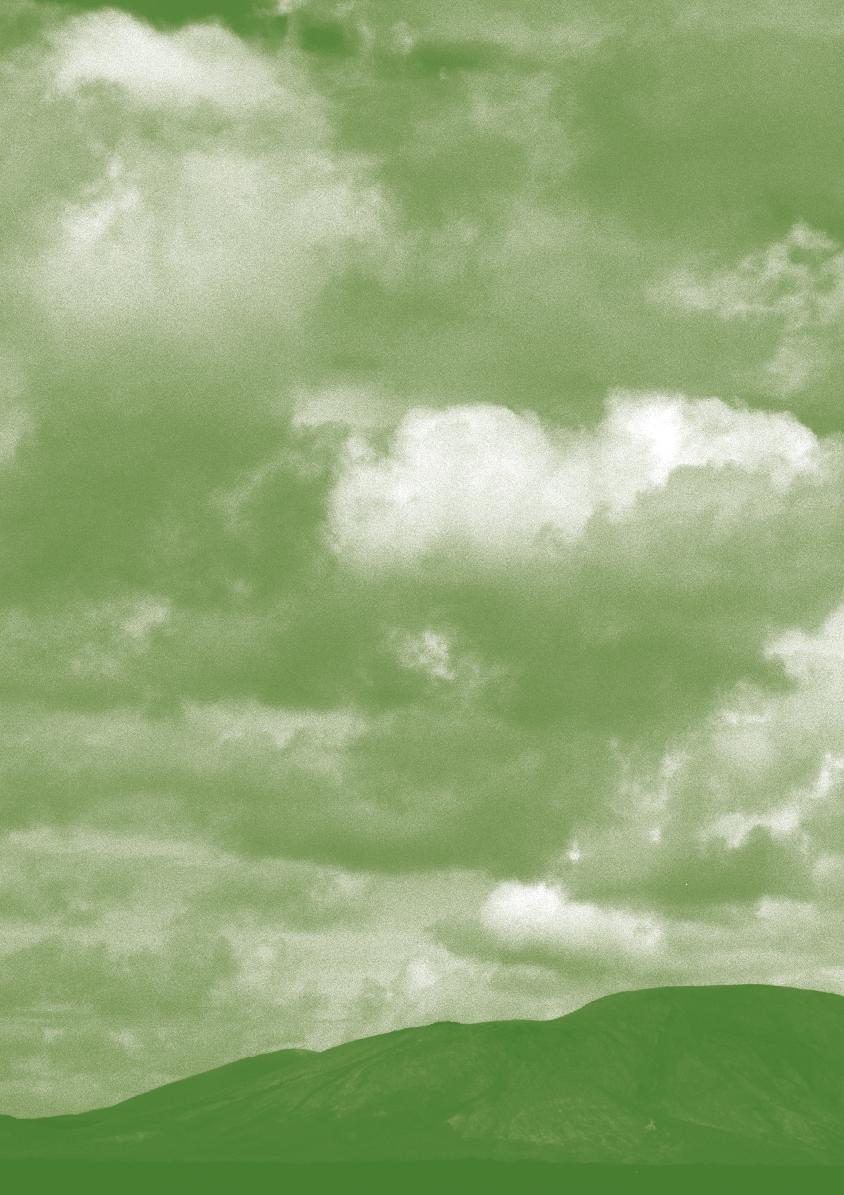
Since October 7th 2023, we have witnessed the relentless depravity of the Israeli government in the ongoing genocide of Palestinians, as normative institutions and our governments are complicit through their silence, failing to stand for justice and liberation.
Reflecting on our wider ESEA and pan-Asian community, and our desire to develop an environmental practice rooted in decolonisation and anti-imperialism, we felt impelled to bring our community together in solidarity with Palestinian liberation.
In seeking to build an ongoing programme of political education – and move away from mobilisation towards organisation – we refer back to the following questions:
What could Asian solidarity with Palestine and wider anticolonial and anti-imperialist organising look like? How can our community heal our fractures to move beyond surfacelevel identity politics? How can we hold our own pain while enacting solidarity with interlinked causes?
When considering Asian solidarity within a Western diaspora context, we find ourselves bumping up against a more liberal and individualist understanding of solidarity, which prioritises the individual struggles of our community.
In order to move towards a more collective understanding of solidarity, we must contend with our entangled struggles against imperialism, settler colonialism, and environmental destruction, and how our interdependence is the root of our collective power.
As a climate justice group rooted in anti-racist and decolonial political values, through Green Lions, we want to amplify and contribute to the building of greater panAsian solidarity with Palestinian liberation and collective struggles related to imperialism, colonisation, and environmental destruction.
This was the genesis of our first Palestine Solidarity & Climate Justice teach-in, held in May 2024 in East London and what we hope to achieve in this zine. In collating our reflections and the discourses examined in the teach-in, we hope to share these resources amongst our communities as we reflect on our social and ethical fractures, push our communities into a new space of action, and consider how we can deepen our solidarity with Palestinian liberation and climate justice movements.
In the zine, we mirror the format of the teach-in, providing a political and historical background to Israel’s settler colonial project, before divinginto specific case studies of transnational solidarity and direct action, and reflecting on our own community and what our political voice could look like.
As a central part of our wider programme of political education and organising, this zine is a shared collaboration between community organisers, educators, and creatives from the East and South East Asian (ESEA) and pan-Asian communities who stand together against the violence of Zionism, settler colonialism, and imperialism.
A Q&A between Green Lions, Sarona Bedwan and Sara Khan from Makan
Since October 7th 2023, we’ve witnessed the brutal violence of Zionism, settler colonialism, and imperialism playing out in real time, with Israel’s ongoing genocide and occupation of Palestine.
We spoke with Sarona Bedwan and Sara Khan from the Makan team to further expand on their section of the teach-in which contextualised the struggle, expanding on the extractive ideology of political Zionism and the exploitation of natural resources in its settler colonial project.
This Q&A has been edited for publication in the zine. See page 30 for the full interview and further resources.
Green Lions (GL): Can you give us a sense of how Palestinian liberation is inextricably tied to calls for climate justice and ecological transformation?
Sara: The thing that I would start with is that I don’t think any human liberation can be seen as separate from liberation for all other forms of life. We cannot view liberation as an anthropocentric project - we can never take for granted that human liberation is more important or disconnected from all of these other forms of liberation.
Palestinian oppression is linked to the structural causes of climate disaster. The same forces that oppress human beings, also seek to extract resources and conquer and exploit land, as opposed to a symbiotic relationship to land that Indigenous people have.
The forces oppressing Palestinians and creating climate disaster are very much the same, and this must inform our understanding of ecological justice. Understanding the link between Palestinian liberation and climate justice helps us move beyond liberal frameworks like ‘carbon footprints’ and ‘sustainability goals’. Palestine can be a kind of case study that allows us to put into focus the political and structural factors that are causing the climate disaster and can, therefore, help us understand the solutions.
GL: What is the significance in working to develop an explicitly anti-imperialist and anti-colonial green politics and environmental practice, as opposed to these more liberal calls for working towards ‘a more sustainable future’ or ‘carbon targets’?
Sara: In terms of neoliberal frameworks of understanding climate justice, these frameworks promote working within existing structures, which exist to uphold Western imperialism and global capitalism in the first place.
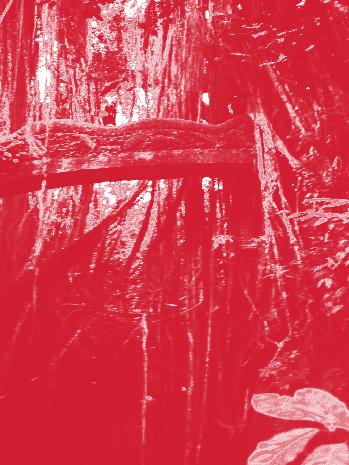
If we’re talking about governments, corporations, and international bodies like the UN, these frameworks are asking us to place trust in systems that uphold the status quo and protect the very systems that have caused the situation that we’re in. That’s the fundamental reason why they’re never going to work - there is a tension between neoliberal reformism as opposed to a revolutionary antiimperialism in general, but particularly with regards to the climate.
You want us to meet a CO₂ emission target for 2030? Well, the planet is dying and we need to solve this now. Israel’s genocide in Gaza is speeding up climate change to the degree that we’re seeing profound natural disasters destroying communities and taking lifethe urgency of this cannot be stressed enough.
Many living within relative comfort in the Global North are unable to comprehend this because it’s not directly affecting us yet. Many people can simply look away because so much of these horrific natural disasters are taking place within the Global South and affecting racialised communities in the world. And even when they are happening in the Global North, it’s poor and racialised communities that are facing the brunt of it. This has everything to do not just with colonial capitalism causing climate devastation, but also also the way that it segregates communities.
a
Sarona: It’s like any form of ‘washing’ - it’s Israel’s ‘raison d’être’ as a settler colonial ethnostate. Anytime we see projects being done by Israel for ‘green sustainability’ or ‘the green transition’, we must ask ourselves how is this furthering the ethnostate? Israel isn’t exceptional in this way - any oppressive state does this. They co-opt ideas or assert they are doing it for the benefit of the majority when it’s to further its own inequalities.
As an example, we can discuss the case study of the Jewish National Fund (JNF). It was created as a propaganda organisation and plants hundreds of non-indigenous pine trees across Palestine as a way to take over land and kill biodiversity across Palestinian land and villages. Colonialism isn’t always just a gun to the head - it can be done through actions that are seen to be ‘beneficial’.
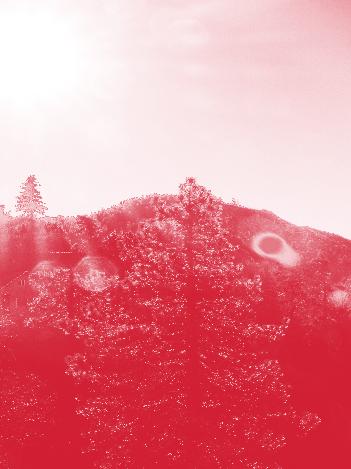
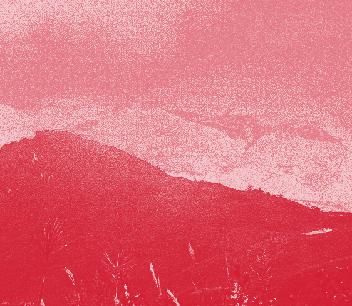
Sara: This is and has been the logic of colonial projects for a very long time. The core of what greenwashing is can be seen through the colonial logic of ‘the white man’s burden’. Since time immemorial, colonial projects have relied on this idea of the coloniser as being more ‘civilised’, more progressive, and superior to the Indigenous people - this is very much what’s at play when it comes to greenwashing.
This idea that the Zionist coloniser is superior, more civilised, a more agriculturally savvy person legitimises colonisation both because it legitimises this idea of the Zionists’ ‘right to the land’. It’s manifest destiny, but also this idea of the ‘white saviour’ and then the ‘civilised coloniser’ coming to rescue this land from its ‘barbaric’, ‘incompetent’ current caretakers.
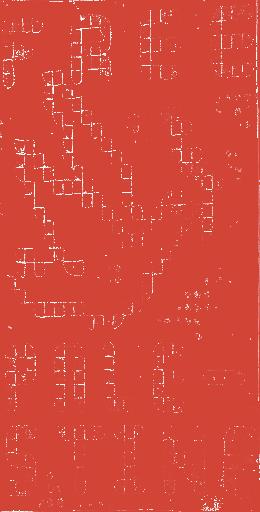
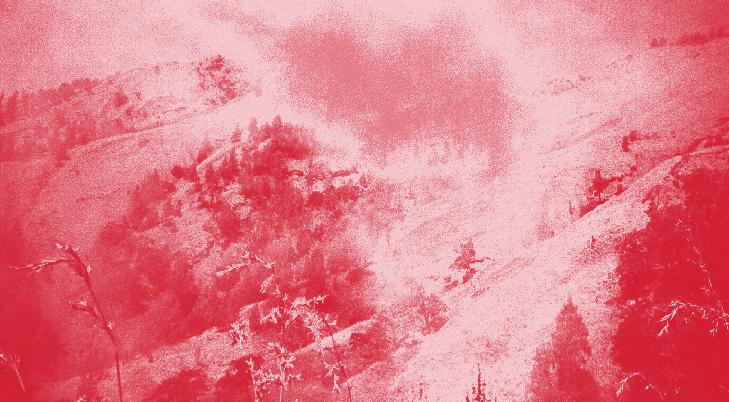
GL: We’ve spoken about how ideas around indigeneity and land are so central when considering Palestinian liberation, but can you expand on the ways in which Israel uses the denial of Palestinian food sovereignty as a weapon of war in its settler colonial project?
Sara: Something we talk about a lot in our work is fragmentation. In the context of climate, Israel not only fragments Palestinians from each other geographically, but also fragments Palestinians from their land - a consequence of which is that Palestinians are being separated from sources of and the production of food.
One way of understanding this is the manufacturing of dependence on the state of Israel and Western imperial powers. Many Palestinians have to essentially rely on Israeli companies or on Western aid in order to access food. So, a series of policies that prevent Palestinians from owning land, from having access to water, from being able to grow food etc., which means profit for Israel.
With an understanding of this problem, we can also understand the means of resistance. One great example of this is during the First Intifada, when Palestinians identified the problem of their dependence on Israel. So, their means of resistance included boycotting Israeli companies and supermarkets, but also cultivating their own food.
There’s a great documentary on this called The Wanted 18 about how some Palestinians during the First Intifada were able to get their hands on some cows from a nearby kibbutz, and essentially learned how to milk and care for cows, which are not an indigenous species to Palestine. This was part of the process of reclaiming food sovereignty and the ability to be self-reliant and dependent on their own sources of food production which, ultimately, is more sustainable than any neoliberal, capitalist sustainability initiative. Israel responded by criminalising the cows.
There’s also a sense in which fragmentation is not only physically, but deeply emotionally and psychologically damaging to Palestinian communities.










Sarona: That last point Sara said is important because it demonstrates to us ecological violence as a form of intergenerational trauma that is then being inflicted - it shows this criminalisation of caretaking of the land.
One example is the criminalisation of foraging, shepherding, and seed conservation, often through nature protection laws. There have been multiple aggressive attempts and policies to eliminate Palestinian farmers since the creation of Israel in order to ‘modernise’ their farming techniques. Even though Israel promotes itself as a country that made the desert bloom, Palestinian farmers have been subjected to Israel’s manipulation and use of experiments that have cost them not only being able to use their native seeds, but also their livelihoods.
There’s a specific plant I’d like to focus on: Za’atar is a common spice that’s used throughout Palestinian-Arab society and it’s seen as a stronghold of resistance, by being able to grow and forage it. But, in 1977 Ariel Sharon declared Za’atar a ‘protected plant’. So, again, using the language of climate sustainability to fragment and criminalise Palestinians from their land, which stopped it from being able to be foraged, and possessing or trading it became a criminal offence.
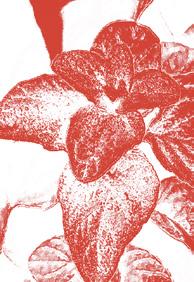

GL: This manufactured dependence on Israel not only plays out with regards to food sovereignty, but also water. Can you unpack how Zionist extractivism has used the theft and control of water and the manufacturing of a water crisis to maintain power?
Sara: In the early days of the Zionist movement, early visions for their borders included key water resources in the Arab region. These borders expanded to cover areas like the Litani River in Lebanon and the Golan Heights in Syria, which is still under Israeli military occupation.
We can see the continued desire from these initial Zionist aspirations to take over key water resources when we look at the UN partition plans and the Zionist entity hoarding fertile land and key water resources, as well as Israel’s ongoing expansionism to create a ‘greater Israel’; expanding into Lebanon like it did in the 1980s and again now, and it’s ongoing occupation of the Syrian Golan Heights.
But, there are various other ways in which Israel controls water. It has manufactured a highly sophisticated and intentional water system that redirects
water to Israeli settlements and deprives Palestinians of water.
Oftentimes, when we hear about these crises, they’re presented to us in a depoliticised way. But, this is not a natural famine, it’s a manufactured food crisis. The lack of sanitation and the lack of water in Gaza is not by chance, it’s a manufactured water crisis by Israel.
Sarona: There’s a really amazing scholar named Muna Dajani whose work focuses on re-politicising water - especially in the Palestinian context. She writes about the ways in which the environmental issues in the water crisis are deeply political and inextricable to the settler colonial state, and how many technological advances work to manage and maintain the system, rather than support a just political path.
Before the genocide and last October, Gaza had one working sewage treatment system and now that has been rendered obsolete. This means that people cannot access clean water, so even if Palestinians aren’t being murdered by the bombs and missiles, there are health problems that are occurring from the intentional targeting of infrastructure. So, when we are thinking about pushing back against colonial or liberal notions of a green transition, we must also think about the ways in which colonialism debilitates people’s ability to access food and also water.
In the case of destroying sewage plants, for example, we have to consider the fact that all of the waste is going into the sea and what that is doing to the sea surrounding Gaza. Unfortunately, I don’t think we’re going to have an accurate picture of the ecological damage given the amount of destruction that’s happening.

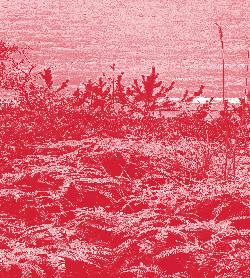
GL: Building on this need to politicise the various crises happening in Palestine as we speak, how is Palestine’s climate apartheid and the racialised impact of the climate crisis being depoliticised by the Global North?
Sara: The first thing that comes to mind for me with this question, is that Western climate movements constantly say that we need to be fighting for sustainable futures because we need to make sure that the world is going to be livable for our children.
This sort of refrain is a quintessential example of that de-politicisation of climate apartheid, whereby the world starts and ends in the Global North. This way of framing the climate crisis betrays that the Western climate movement is a perspective that comes from people who aren’t experiencing the brunt of its effects. As I mentioned earlier, the people who are experiencing the brunt of its effects are largely in the Global South or within racialised and poorer communities of the Global North.
That is the main way in which I see climate apartheid being depoliticised, which is through the white Western perspective that erases the fact that people are already experiencing these effects.

Sarona: It serves liberals within the climate movement to be able to point to Palestine and go “we don’t have time to focus or talk about Palestine, because we need to focus on the climate”, as if those two things are separate.
How it does it is through an intentional misanalysis and also through ‘humanitarian’ language and actions. For example, the Green Climate Fund wants to treat wastewater, but Gaza has been subjected to an illegal blockade and siege, which isolates it not just from the rest of Palestine and other avenues of water access, but from the rest of the world.
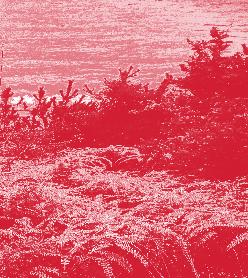
These programmes tend to use the language of humanitarianism, but do not inherently address the structural, root causes of imperialism and colonialism. This is not to dismiss the real and material ways some humanitarian organisations deliver necessary supplies to people. But, rather, we need to not solely rely on these institutions as they aren’t there to resolve the political driversthey treat the symptoms only.
With the genocide in Gaza, obviously, it’s great that people are giving money to humanitarian aid - people need food, water, all that stuff. However, this is not going to fix the political problem. Aid is being withheld by the very state that’s conducting that genocide. Part of the problem is also assuming that the coloniser will do its due diligence. We cannot rely on Israel to deliver aid. This is intentional, deliberate, and manufactured.
SARA: The de-politicisation of climate apartheid is underpinned by racial logics that the natural state in which racialized people live is one of perpetual poverty, disaster, war and struggle.
There’s a sense in which Palestinian suffering and the suffering of racialised people in the Global South and North is something that has become naturalised and, because we’re so prone to thinking that Palestinian suffering is the natural state of affairs, people are not asking the right questions about how climate change is being accelerated through a series of intentional policies.
GL: And finally, Palestinians have long resisted Israeli occupation and imperialism - something that allies and those organising now should look to, acknowledge, and take heart from. What would Makan’s call to action be for allies and those who are seeking to move beyond education and towards organisation in this collective struggle?
Sara: We’ve talked a lot about what Palestinians have overwhelmingly asked of the international community in order to bring about a political solution for this crisis - and many are choosing to engage in BDS.
There’s multiple ways that the international community can familiarise themselves with BDS’s three key demands, which are the right of return for all Palestinian refugees; the end to the military occupation of the West Bank, East Jerusalem, and Gaza Strip; and equal rights for all Palestinians living throughout the land of historic Palestine. People have been boycotting and doing that on an individual basis, whilst others are also getting organised within their communities and institutions in order to campaign for divestment - whether that’s at their university, local council, church, etc. to campaign for divestment. Ultimately the Palestinian rights movement is about Palestinians being in control of their own destinies, their own food production, and water production etc.
In that vein, another pressing tactic many are choosing to engage in is demilitarisation. We’ve talked a lot about the many aspects of climate disaster today - one of the most immediately devastating issues is Israel’s insane military apparatus and the truly unfathomable devastation that it’s causing to our planet. Militaries are the biggest polluters. They create the highest carbon footprint of any industry - we’re talking about billions of tonnes of CO₂ emissions from the military industrial complex.
Our countries here in the West are the biggest military powers in the world and equally the biggest funders of Israel’s military. So, the work that organisations and grassroots organisers are doing within various countries to bring down the military industrial complex will not only have an enormous impact in terms of Palestinian liberation, but also in terms of ending the destruction of our planet.
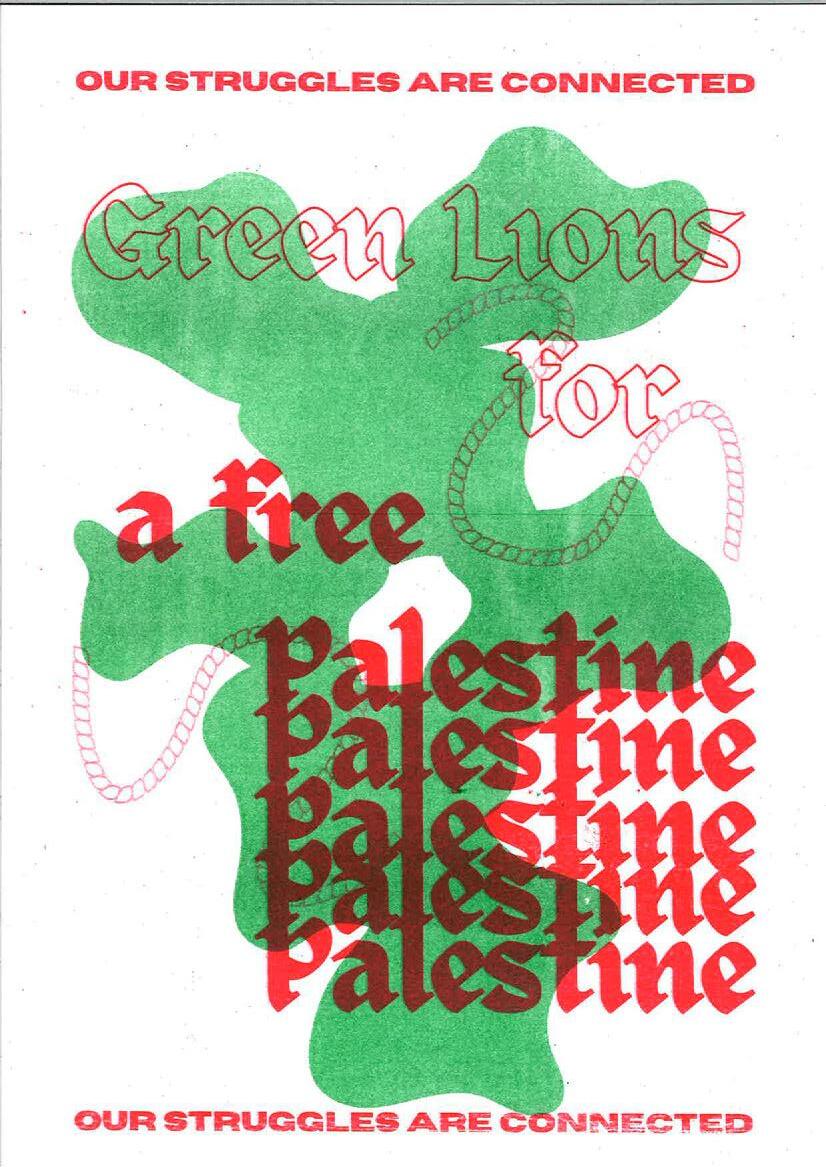
Words by Energy Embargo for Palestine
When interrogating Israeli settler colonialism and the devastation its expansionist approach necessitates, it is crucial to expose and acknowledge how intrinsically tied Israel’s power is to its control of energy in the region. With this in mind, we invited Energy Embargo for Palestine (EEFP) to speak at the teachin to the foundational role of energy and the dispossession of Palestinian land in the building and sustaining of Israel’s settler colonial project.
This section summaries some of the key learnings from their presentation and EEFP’s ongoing work in shining a light on the complicity of British Petroleum (BP) and the British state in fuelling genocide.
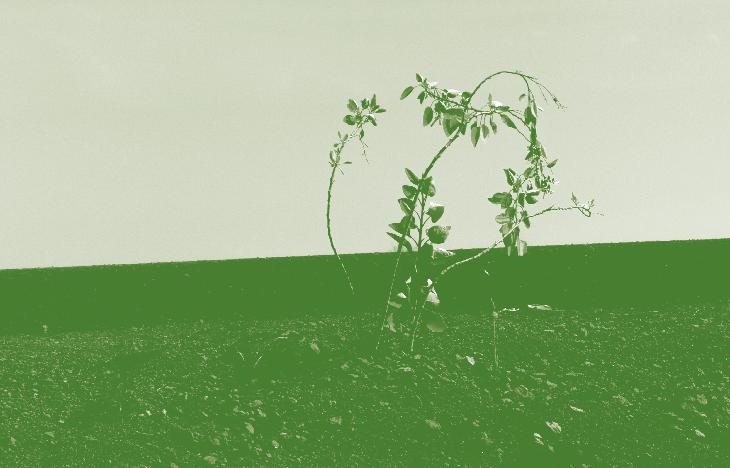

Mainstream climate discourse often focuses on the current moment of climate breakdown and global warming, looking at recent global climate agreements starting from the late 20th century, but the story goes back much further. Energy politics, infrastructure, and colonial violence have long been at the foundation of Israel’s settler state-building project - aided by continued Western and corporate multinational complicity. In the decades before Israel’s ‘founding’ in 1948, the World Zionist Organisation set up the Palestine Electric Company which claimed extensive control over Palestinian land and waterways in order to build power stations and grid infrastructure used to build Jewish settlements. Through the complicity of multinational oil corporations – the Iranian Consortium of Seven Sisters – Iranian oil was shipped to Israel and Europe through the Eilat-Ashkelon pipeline built on Palestinian land.
But as long as imperialist energy systems have existed, so too has resistance against them. During the 1936-1939 revolution in Palestine, groups blew up a section of the BP Oil pipeline running from Iraq to Haifa because they understood energy as the lifeblood of the colonial Zionist project and the British mandate that upheld it. At Energy Embargo for Palestine, we look to this history of resistance to inform our direction.
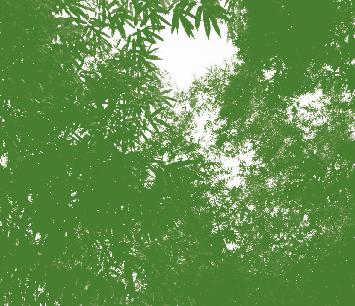

This colonial legacy is alive and well to this day. In November 2023, along with other Western energy conglomerates, BP was granted a gas exploration licence in occupied Palestinian waters by the Israeli Ministry of Energy, further dispossessing Palestinians from sovereignty over their land and waters.
This is on top of their holdings and activities in the lucrative Baku-Tbilisi-Ceyhan (BTC) pipeline, which supplies Israel with 28% of its oil, and facilitates and upholds capitalist global systems of oppression and exploitation. The oil refined from this pipeline has been proven to directly fuel Israeli state and military operations and is an imperialist project at its core, backed by the US and enabled by the British state.
Western companies profit from the spoils of war, which Britain and other imperial powers directly enable, with their involvement in the Middle East predicated on labour exploitation, imperialism, and extraction. We must, therefore, end Britain’s complicity in the genocide in Gaza by demanding an embargo on the energy that fuels the Zionist project.
Through an explicitly anti-imperial and anti-colonial green politics, we contextualise the political and economic systems that oppress all of us on a global scale and better understand how to dismantle them.
When we trace energy supply chains to their source, what lies at the core are multinational energy corporations and the fossil fuel industry, driven by greed and profit at any cost - even if it means fuelling the genocide in Palestine. In an oil-centred and capitalist global order, it comes as no surprise that Western states in the Global North remain unflinchingly committed to backing Israel as a key ally, maintaining imperialist relations and US hegemony.
For those of us based in the Global North, it is crucial that we leverage our position, organising in the heart of the imperial core, to target and expose the geopolitical weaknesses and vulnerabilities of Israel in order to remove its alliances with Western states.
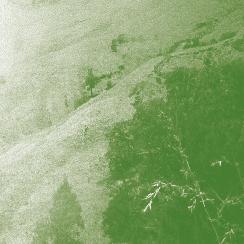
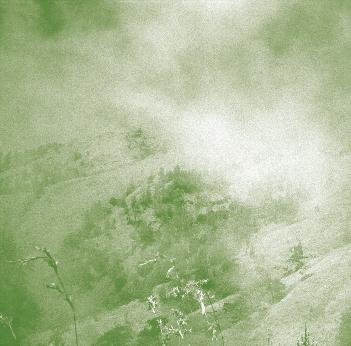

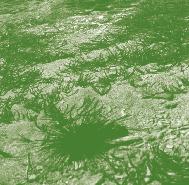
Lately, there’s been a renewed emphasis on the fundamental importance of demilitarisation and an arms embargo of Israel’s vast military apparatus. However, it is crucial that when calls for an arms embargo occur, those for an energy embargo must follow in close succession.
Israel is a hyper-militarised society in which the distinction between civilian and military is effectively non-existent; the energy pipelines which fuel the military jets and vehicles are the same pipelines fuelling illegal settlements. All settler colonial projects are also military projects by form and definition, as they rely on the dispossession of land from the native populace by force and by militarised violence. There can, therefore, be no distinction made between any of the oil refined from the BTC pipeline and oil processed in Israel itself, and that which is used in fuelling the Zionist project and genocide.
As the urgency of building an organised movement that confronts complicity in the Zionist project increases, the Global North must reckon with the importance of deep solidarity with anti-imperialist national liberation movements in the so-called Global South. We must seek to isolate Zionism by making Western support for it economically unfeasible. It is only by our collective struggle and the mass disruption of points of strategic importance – such as global energy supply chains – that we will be able to bring ourselves closer to dismantling Western imperialist interests in propping up Israel’s settler colonial project.
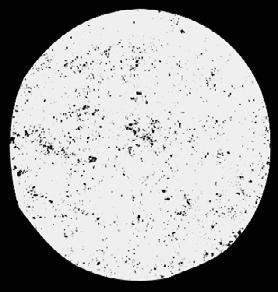
By Yung & MTP
Yung and Marie-Therese Png, researchers and community organisers, take us through a journey of anti-militarism solidarities within the context of transnational solidarity with Palestine. Through protests against the military-tech industrial complex – in London, Okinawa and Palestine – we find connected oppressions, but also connected resistance. By exploring technology supply chains and how they tie different communities together crossterritorially, we connect resource justice and climate justice movements, which ultimately connect us back into the earth.
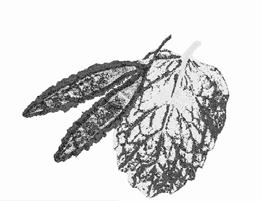
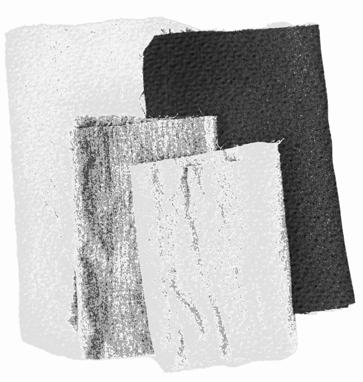
The genocide in Palestine is facilitated by the environmental warfare wrecked by the Israeli state and the military-tech industrial complex, comprised of Western governments that provide Israel with diplomatic immunity and the multinational technology corporations that influence technology development while bolstering Israel’s military capacities. For example, the US and UK continue to sell arms to Israel without impunity, while companies like Google and Amazon hold lucrative military contracts with the Israeli government to provide cloud services to the Israeli government and the IDF1 . These ties have been revealed by organising groups such as No Tech for Apartheid who highlight the complex ties between complicit governments and corporations.
Israel’s enactment of genocide in Palestine, bolstered by the military-tech industrial complex has caused extensive pollution and ecological devastation, which both further endagers human life while scarring the ecological territories of ancestral lands. Just one month into the genocide, the equivalent of 2 nuclear bombs have been dropped in Gaza 2. Almost half of the 281, 315 tonnes of CO2 emissions from the siege on Gaza has been a result of US weapon supply flights to Israel 3 . That AI has become a tool to enact genocide in Palestine underscores how technology, environmental warefare and genocide are inextricably tied.
In the face of this terror, resource and environmental justice movements do the important work of contesting the military-industrial complex that pervades too much of life. This cross-movement anti-militarism thus stands against the military tech supply chain to connect our shared oppression and thus shared resistance back into the earth.
Almost
half of the 281,315
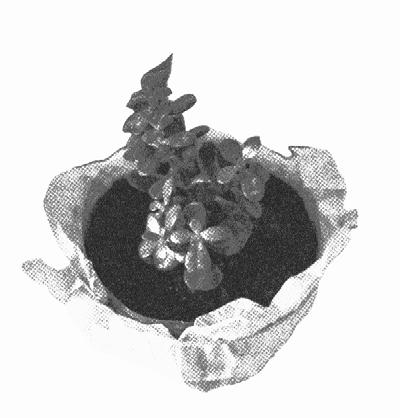
Anti-militarism movements, stemming from academic and activist work, protest the production and sale of weapons, state-sanctioned violence, military repression and dominance, and how these ties flow across borders. For example, histories of shared Indian and Israeli counter terrorism training and surveillance technology sales tie Palestinians and Kashimiris together in shared connective resistance, mirroring Israel’s military connections to past authoritarian regimes in Latin America and to the apartheid regime in South Africa.
Writing about transnational solidarities that connect the US, Palestine, Türkiye and other places, Angela Davis invokes Black feminist sociologist Jacqui Alexander
1 Tell Google and Amazon: Stop doing business with Israeli apartheid, No Tech for Apartheid, 2024.
2 Israel hits the Gaza Strip with the Equivalent of Two Nuclear Bombs, EuroMed Monitor, 2023
3 Emissions from Israel’s war in Gaza have ‘immense’ effect on climate catastrophe, Guardian, 2024
4 Angela Davis, Freedom Is a Constant Struggle: Ferguson, Palestine and the Foundations of a Movement, Haymarket Books, 2016.
5 Margo Okazawa-Rey, Nationizing Coalition and Solidarity Politics for US Antimilitarist Feminists, Social Justice, 2020.
6 Tischner Jozef, The Ethics of Solidarity, 2005.
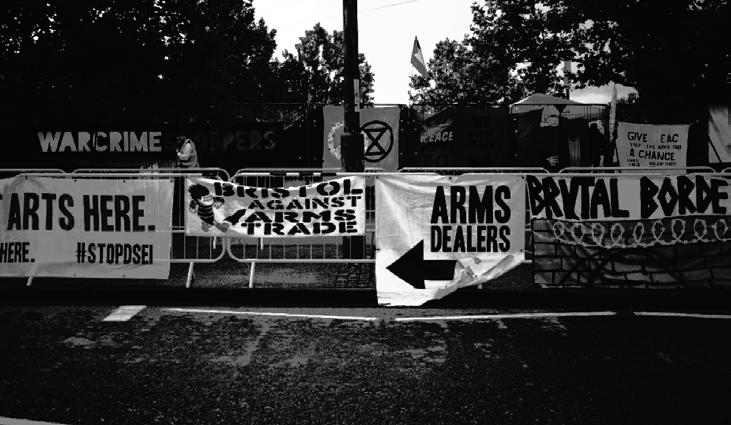
and her exhortation to learn each other’s stories: ‘our histories never unfold in insolation. We cannot truly tell what we consider to be our own histories without knowing the other stories. And often we discover that those other stories are actually our own stories’4 .
The London Arms Fair is one of the largest in the world, returning every 2 years for governments, militaries, and companies from all over the world to come to explore the latest technologies of warfare (i.e. autonomous tanks, drones and facial recognition software). Without fail protesters return, organised by the Campaign Against the Arms Trade (CAAT) and Stop the Arms Fair (STAF), to resist the ‘dealers of death’ welcomed by the British government – from Saudi Arabia’s genocidal assault on Yemen, to the Turkish state’s attacks on the Kurds, to Israel’s
ongoing colonisation of Palestine –these perpetrators of warfare meet to browse and compare the best ways to kill. Last year, organisers were joined by Palestine solidarity, climate justice and migrant justice campaigns, forging connective solidarities from London.
These solidarities foreground a sustainable environment as a key principle to genuine security, and as such, bring us back into the earth, seeking to return militarised land to occupied and indigenous peoples. Organisations such as the DSA International Committee work towards solidarity that knows no borders. In Okinawa, which has been under Japanese colonialism and subject to environmental warfare from US military operations since WW2, Palestine solidarity has bloomed from both shared oppression and resistance. Despite different histories and politics,
militarism and environmental warfare are having a multigenerational impact on the planet and people, with the control of land and the environment as key nodes of power. Today, Okinawa hosts 70% of US military bases in Japan – bases whose operations pollute land and water with oils, solvents, jet fuel, herbicides and other hazards – despite Okinawa representing only 3% of Japan’s total landmass. While in Palestine, genocidal warfare has reduced landto rubble, severing Palestinians from critical infrastructure like power, water and sewers.
Okinawa to Palestine - Struggles against military occupation and colonialism by DSA International Committee, 2023 B
International Women’s Network Against Militarism in Okinawa, daily protest at Camp Schwab by MTP C
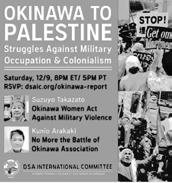
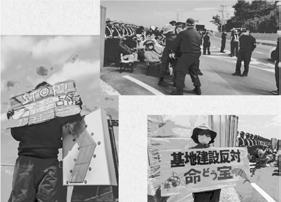
These examples of transnational solidarity foregrounds the core principles of a resource and climate justice approach to anti-militarism: sustainability as security, the return of occupied land to indigenous peoples, and connectivities within the cross-border tech supply chain and back into the earth.
Through the lens of transnational anti-militarism solidarities, Yung and MTP suggest that an ‘ethical solidarity’ recognises and confronts the forces that disconnect people in and across locations. It moves us beyond simply being the opposition in struggles against militarism. In this sense, one of our critical responsibilities is to envisage a world that is genuinely secure for humans and the natural environment, not just to challenge state-based ideas about national security.
“Ethical solidarity is generative. It is “what needs to be done… [it] unifies us and encourages [us] to act. It binds us more deeply and more permanently than the fear of enemies”
5, 6
by contributors (including full Q&A with Makan)
In executing this zine we have many folks to thank: Sarona and Sara at Makan, Energy Embargo for Palestine, Yung & Marie-Therese Png, and Isabella Kajiwara for speaking at our first teachin and all their work on collaborating on the content of this zine. Batch Baby for kindly hosting our first teach-in. Rabbits Road Press for their support with printing our Palestine solidarity prints. Baesianz for all their energy, time, kindness, and generosity in the making of this zine and support in hosting our second community teach-in. The whole Green Lions team and wider community for their care as we collectively organise and agitate for a more equitable and climate just world.

